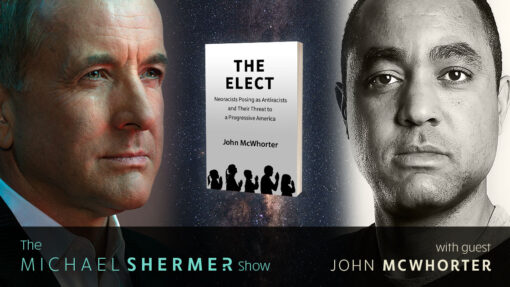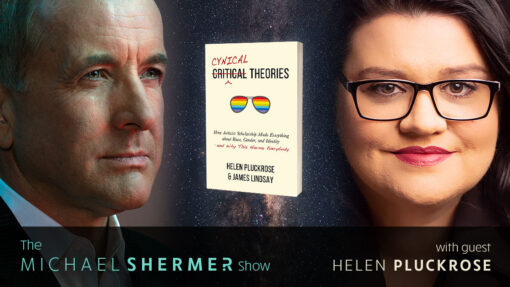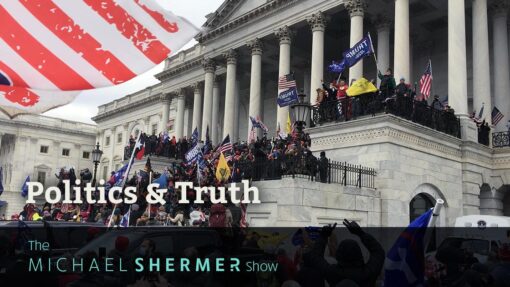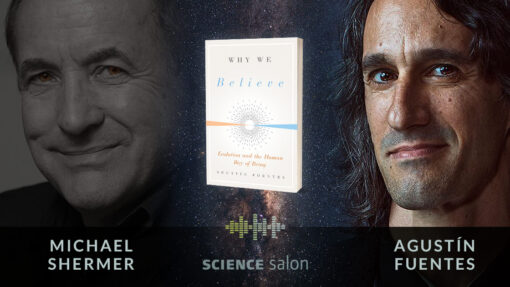violence

Shermer, Weiss, and Bartning discuss: why we need FAIR when we have the ACLU, the SPLC, etc. • Richard Dawkins canceled by the AHA • hate speech as violence • how Liberal and Conservative attitudes have shifted • private vs. public speech • government censorship vs. cancel culture • social media companies: platforms or publishers? • anti-Semitism • QAnon • conspiracies • why free speech is foundational to other rights, and more…
In episode 183 of Michael Shermer’s podcast, Michael speaks with Bari Weiss and Bion Bartning about their new Foundation Against Intolerance and Racism (FAIR).

In episode 165 of The Michael Shermer Show, Dr. Shermer speaks with John McWhorter about his new online book on how the antiracism movement poses a threat to progressive America. Shermer and McWhorter discuss: antiracism as a religion; the 3 waves of antiracism; the antiracism trinity: Ta-Nehisi Coates, Robin DiAngelo, Ibram X. Kendi; white fragility; Black Lives Matter; systemic racism (incarceration rates, housing, jobs, income, etc.); reparations; George Floyd, Tony Timpa and police violence; the N-word and language as violence;…
In episode 165 of The Michael Shermer Show, Dr. Shermer speaks with John McWhorter about his new online book on how the antiracism movement poses a threat to progressive America. Shermer and McWhorter discuss: antiracism as a religion; the 3 waves of antiracism; the antiracism trinity: Ta-Nehisi Coates, Robin DiAngelo, Ibram X. Kendi; white fragility; Black Lives Matter; systemic racism (incarceration rates, housing, jobs, income, etc.); reparations; George Floyd, Tony Timpa and police violence; the N-word and language as violence;…

In episode 163 of The Michael Shermer Show, Dr. Shermer speaks with Helen Pluckrose about her book (co-authored with James Lindsay) Cynical Theories: How Activist Scholarship Made Everything About Race, Gender, and Identity—and Why This Harms Everybody.
Skeptic Magazine 26.1: Cosmic Beginning is Available Now! Instantly Download the Digital Edition or Pre-order the Print Edition Today. PLUS: In episode 163 of The Michael Shermer Show, Dr. Shermer speaks with Helen Pluckrose about her book (co-authored with James Lindsay) Cynical Theories: How Activist Scholarship Made Everything About Race, Gender, and Identity — and Why This Harms Everybody.

Why are so few people talking about the eruption of sexual violence and harassment in Europe’s cities? In episode 156 of The Michael Shermer Show, Dr. Shermer speaks with Ayaan Hirsi Ali, a Somali-born women’s rights activist, free speech advocate and New York Times best selling author, about her new book Prey: Immigration, Islam, and the Erosion of Women’s Rights.
In episode 156 of The Michael Shermer Show, Dr. Shermer speaks with Ayaan Hirsi Ali, a Somali-born women’s rights activist, free speech advocate and New York Times best selling author, about her new book Prey: Immigration, Islam, and the Erosion of Women’s Rights.
In episode 152 of The Michael Shermer Show, Michael responds to critics, reminding us that whether a particular conspiracy theory is true or false very much matters — especially those in the realm of politics, economics, and ideology, which as we’ve seen matters very much to the stability of our democracy and trust in the institutions that keep society stable.

In episode 152, Dr. Michael Shermer responds to critics of episode 151, reminding us that the truth or falsity of a claim of any kind that can be adjudicated by science and reason applies not just to astrologers, psychics, UFO proponents, and Big Foot hunters (all of which we cover in Skeptic magazine), but to conspiracy theories, including and especially those in the realm of politics, economics, and ideology, which as we’ve seen matters very much to the stability of…
In this cover story article (written in October 2020) for Skeptic magazine 25.4 (December 2020), Daniel Loxton considers the unsavory origins and rising threat of the QAnon conspiracy theory. Written prior to the deadly QAnon-led occupation of the Capitol Building in Washington, DC on January 6, 2021, this analysis exposes the conspiracy theory as baseless, unoriginal, and harmful for believers and society at large.

In this cover story article (written in October 2020) for Skeptic magazine 25.4 (December 2020), Daniel Loxton considers the unsavory origins and rising threat of the QAnon conspiracy theory. Written prior to the deadly QAnon-led occupation of the Capitol Building in Washington, DC on January 6, 2021, this analysis exposes the conspiracy theory as baseless, unoriginal, and harmful for believers and society at large.
In this monologue commentary on the events of January 6, 2021, Dr. Shermer applies causal inference theory to Trump’s speech that morning, the violent assault on the Capitol that followed, the banning of Trump off social media platforms like Twitter and Facebook, the fears on the Right of social media censoriousness on the Left, the breaking up of big tech social media companies, and related topics, including what it means to “believe” a conspiracy theory.

In this monologue commentary on the events of January 6, 2021, Dr. Shermer applies causal inference theory to Trump’s speech that morning, the violent assault on the Capitol that followed, the banning of Trump off social media platforms like Twitter and Facebook, the fears on the Right of social media censoriousness on the Left, the breaking up of big tech social media companies, and related topics, including what it means to “believe” a conspiracy theory.

Perhaps one of the most bizarre beliefs rampant in modern times is that malign, shape-shifting reptilian extraterrestrial invaders, disguised as human beings, secretly control the governments of the world. It is possible that we recently experienced a violent consequence of that belief.

Why are so many humans religious? Why do we daydream, imagine, and hope? Philosophers, theologians, social scientists, and historians have offered explanations for centuries, but their accounts often ignore or even avoid human evolution. Fuentes employs evolutionary, neurobiological, and anthropological evidence to argue that belief — the ability to commit passionately and wholeheartedly to an idea — is central to the human way of being in the world.
Why are so many humans religious? Why do we daydream, imagine, and hope? In Science Salon # 144 Michael Shermer speaks with Agustin Fuentes about his new book Why We Believe: Evolution and the Human Way of Being.
The Skeptic Research Center presents the first report in the new Civil Unrest & Presidential Election Study: Did Political Disunity Change in 2020? (CUPES-001). PLUS: From the Distinguished Science Lecture Series Archives from October 2011, we present Dr. Steven Pinker discussing his book The Better Angels of Our Nature: Why Violence Has Declined.

Is Electronic Screen Syndrome (ESS) real? Is it a disease? An addiction? Do violent video games cause aggression? Can playing video games have positive effects? In this column from Skeptic magazine 25.2 (2020), Harriet Hall, M.D. examines ESS and shares the science.
In SPAS-006, the researchers asked: “Do people with different political orientations have different bases—evidence or emotion—for their political opinions?” PLUS: Harriet Hall, M.D. examines Electronic Screen Syndrome (ESS) and shares the science.
← PREVIOUS
NEXT →


















